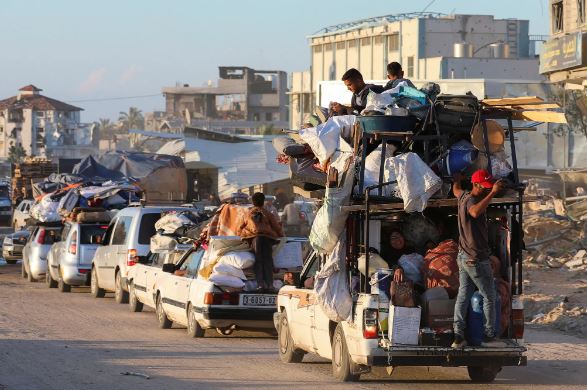Efforts towards a potential cease-fire and a prisoner exchange between Israel and Hamas have seen developments with Hamas indicating acceptance of a proposal on Monday, albeit with minor modifications, according to sources familiar with the revised plan.
The adjusted proposal, facilitated by Arab intermediaries in consultation with William J. Burns, the Director of the Central Intelligence Agency (C.I.A.), maintains crucial language regarding the eventual establishment of a “sustainable calm.” This phrase, previously agreed upon by all parties involved, remains a cornerstone of the proposed agreement.
As per the proposal, Hamas would release hostages, primarily comprising women, elderly individuals, and those requiring medical attention. However, the exact number of surviving hostages is uncertain, potentially resulting in the inclusion of remains in the initial release. In exchange, Israel would observe a 42-day cease-fire and release a larger number of Palestinian prisoners. The intricacies of the deal entail a phased approach, with subsequent stages focusing on achieving a “sustainable calm.”
While both sides have concurred on the concept of “sustainable calm,” discrepancies may arise in its interpretation. Hamas views it as an end to hostilities, involving Israel halting military operations and withdrawing troops from Gaza. Conversely, Israeli Prime Minister Benjamin Netanyahu is expected to contest this interpretation, aligning with Israel’s stance against any explicit reference to a “permanent cease-fire” or an end to the conflict.
The term “sustainable calm” was agreed upon weeks ago after Israel objected to more definitive language. Israeli officials have consistently opposed agreements that could imply a permanent cessation of hostilities or an end to the conflict.
William J. Burns has been instrumental in representing the United States in these negotiations. He is currently in the region, collaborating on proposals and counterproposals. Mediators from Qatar and Egypt engaged with him on Monday to discuss Hamas’s readiness to accept the proposed amendments. While Hamas attributes the changes to Arab mediators, there’s contention over whether Hamas itself suggested them. Burns is slated to participate in talks in Cairo on Tuesday.
Despite Israel’s reservations about the revised proposal, it has agreed to send a working-level delegation to the talks, signaling a commitment to exploring the possibility of an acceptable agreement. The talks in Cairo aim to negotiate the proposed amendments put forth by Hamas and address any remaining concerns.
Qatar has also expressed optimism about the talks, emphasizing the importance of achieving an immediate and permanent cease-fire, facilitating the exchange of hostages and prisoners, and ensuring a sustainable flow of aid into Gaza.
Meanwhile, Israel announced its war cabinet’s unanimous decision to continue military action in Rafah, a move that could potentially jeopardize the ongoing negotiations. Israeli Prime Minister Netanyahu’s earlier assertion of conducting an offensive in Rafah, with or without an agreement, underscores the challenges in reaching a consensus.
U.S. officials have voiced opposition to any unilateral military operation by Israel without adequate plans to minimize civilian casualties and address humanitarian concerns. The strikes carried out by the Israeli military in eastern Rafah on Monday are viewed as part of a smaller operation rather than the outset of a larger assault. Rafah, home to over a million Palestinians seeking refuge amidst the conflict, remains a focal point in the region’s efforts towards peace.
This revised proposal marks a significant step in the ongoing negotiations, underscoring the complexities and challenges involved in reaching a comprehensive agreement between Israel and Hamas.

